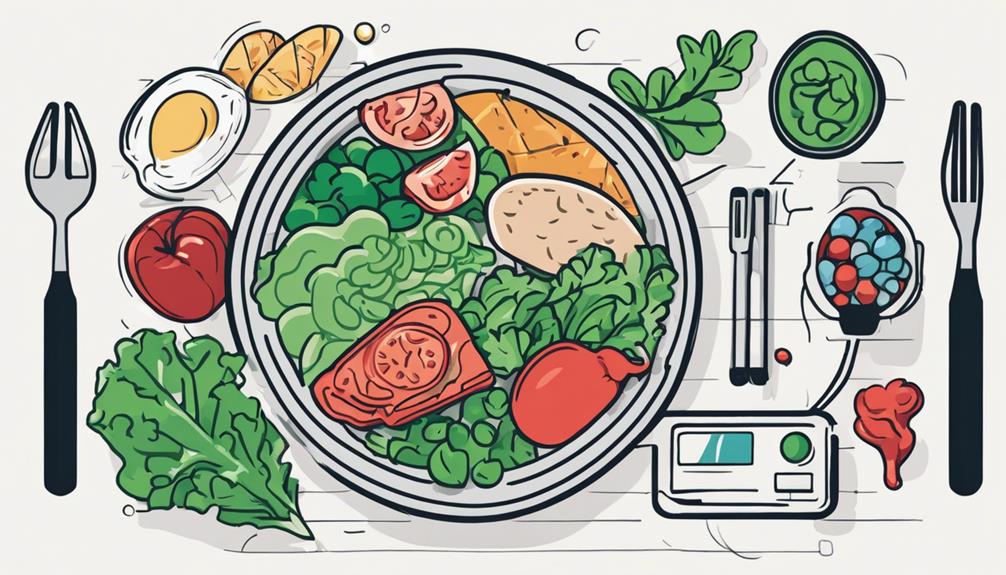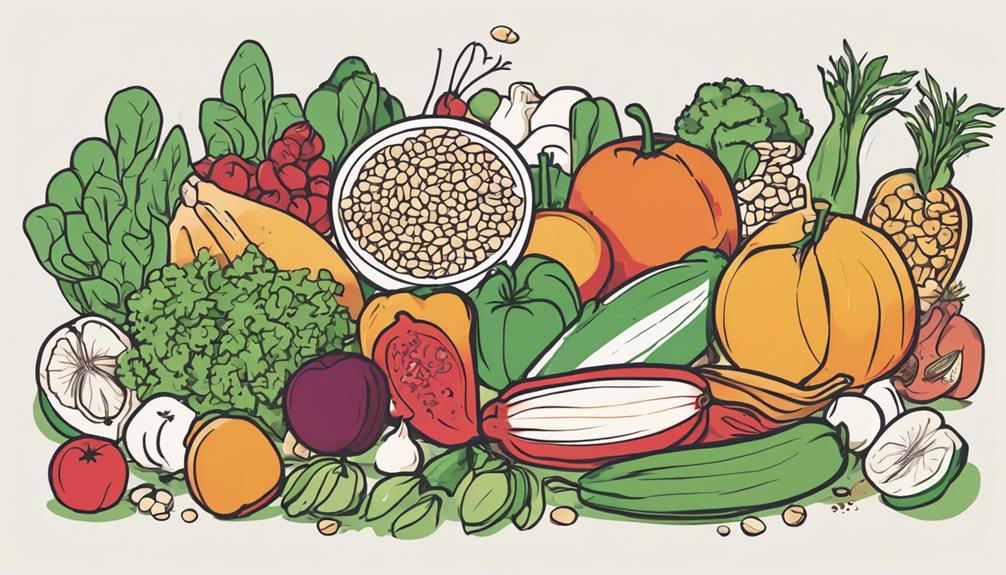With countless diet plans claiming to prevent diabetes, navigating the plethora of options can be overwhelming. But fear not, for we have curated a list of the top 10 diet plans that have shown promising results in diabetes prevention.
These diets range from the well-known Mediterranean diet to the trendy Ketogenic diet, catering to various preferences and health goals. Let's explore how these dietary approaches can potentially transform your health and well-being.
Key Takeaways
- Plant-based diets improve insulin sensitivity and aid in weight loss for diabetes prevention.
- Low-carb diets help manage blood sugar levels and promote weight loss and heart health.
- Community support enhances motivation, accountability, and lasting lifestyle changes for diabetes prevention.
- Specialized diets like the Mediterranean, DASH, Ketogenic, and Weight Watchers offer diverse approaches to diabetes prevention.
Mediterranean Diet

To effectively prevent diabetes, consider adopting the renowned Mediterranean diet for its proven health benefits and disease-fighting properties. Research on the Mediterranean diet has consistently shown its effectiveness in reducing the risk of developing type 2 diabetes. This diet is rich in fruits, vegetables, whole grains, nuts, seeds, and olive oil while limiting processed foods and red meat. The emphasis on fresh, nutrient-dense foods in the Mediterranean diet helps control blood sugar levels and improves insulin sensitivity, crucial factors in diabetes prevention.
When following the Mediterranean diet, incorporating delicious recipes inspired by Mediterranean cuisine can make the transition enjoyable and sustainable. From colorful salads with feta cheese and olives to grilled fish with lemon and herbs, there's a wide variety of flavorful options to explore. These recipes not only promote good health but also add a culinary adventure to your diabetes prevention journey. Embracing the Mediterranean diet can be a tasty and fulfilling way to take charge of your well-being and reduce the risk of diabetes.
DASH Diet
The DASH Diet, short for Dietary Approaches to Stop Hypertension, is a well-studied eating plan known for its ability to help manage blood pressure. It emphasizes fruits, vegetables, whole grains, lean proteins, and low-fat dairy products while limiting saturated fats and sodium.
Following DASH Diet guidelines has been associated with a reduced risk of developing type 2 diabetes, making it a valuable option for those looking to prevent the condition.
DASH Diet Benefits
Consider incorporating the DASH Diet into your daily routine for its numerous health benefits in diabetes prevention. The DASH Diet is known for its positive effects on blood sugar control, weight loss, heart health, and inflammation reduction.
4 key benefits of the DASH Diet include:
- Blood Sugar Control: By emphasizing whole grains, lean proteins, and fruits and vegetables, the DASH Diet can help stabilize blood sugar levels.
- Weight Loss: The DASH Diet promotes weight loss through its focus on nutrient-dense foods and portion control.
- Heart Health: With its emphasis on reducing sodium intake and increasing potassium-rich foods, the DASH Diet can improve heart health.
- Inflammation Reduction: The DASH Diet's focus on anti-inflammatory foods like fruits, vegetables, and whole grains can help reduce inflammation in the body.
DASH Diet Guidelines
Implementing the DASH Diet guidelines into your daily eating habits can significantly contribute to your overall health and well-being. To adhere to the DASH Diet, consider meal prep tips such as cooking in batches to save time during the week.
Focus on incorporating more fruits, vegetables, whole grains, and lean proteins into your meals. When grocery shopping, prioritize fresh produce, low-fat dairy, and foods low in saturated fats and sugars. Reading food labels can help you make informed choices. Opt for whole-grain bread, brown rice, and whole-wheat pasta.
Choose lean meats like poultry and fish, and include plant-based protein sources like beans and nuts. By following these guidelines and incorporating meal prep and grocery shopping tips, you can align your eating habits with the DASH Diet for better health.
Low-Carb Diet

When considering diabetes prevention, a Low-Carb Diet can play a crucial role.
By focusing on the benefits of reducing carbohydrate intake, understanding sample meal plans, and following expert recommendations, you can take proactive steps in managing your diet for potential diabetes prevention.
Low-Carb Diets have shown promise in helping to regulate blood sugar levels and may be a valuable tool in your diabetes prevention toolkit.
Benefits of Low-Carb
A low-carb diet offers numerous benefits for individuals looking to manage their blood sugar levels effectively and reduce the risk of developing diabetes. When considering the benefits of a low-carb diet, here are some key points to keep in mind:
- Improved Blood Sugar Control: By reducing carbohydrate intake, you can help stabilize blood sugar levels and decrease the need for insulin in individuals with diabetes.
- Weight Loss Benefits: Low-carb diets are effective for weight loss, which can further help in managing diabetes and reducing insulin resistance.
- Reduced Risk of Heart Disease: Studies have shown that low-carb diets can lead to improved heart health markers such as lower cholesterol levels.
- Increased Energy Levels: Many individuals on a low-carb diet report higher energy levels, which can positively impact overall well-being and daily activities.
Sample Meal Plans
To effectively incorporate a low-carb diet into your lifestyle, understanding and implementing sample meal plans can be pivotal in managing blood sugar levels and reducing the risk of diabetes. When planning your meals, focus on lean proteins like chicken and fish, non-starchy vegetables such as leafy greens, and healthy fats like avocado and nuts.
Meal prep tips can help you stay on track by preparing your meals in advance, ensuring you have healthy options readily available. Experiment with recipe ideas like cauliflower rice stir-fry or zucchini noodle spaghetti to keep your meals exciting and satisfying.
For snacking strategies, opt for snacks like Greek yogurt with berries or a handful of almonds. Remember portion control guidelines to maintain a balanced intake while enjoying the benefits of a low-carb diet.
Expert Recommendations
For optimal health benefits and effective diabetes prevention, incorporating expert recommendations for a low-carb diet is essential. When considering a low-carb diet to prevent diabetes, expert recommendations emphasize the following:
- Nutritional Counseling: Seek guidance from a registered dietitian or healthcare provider for personalized advice on low-carb meal planning.
- Lifestyle Changes: Adopting a low-carb lifestyle involves more than just diet; it includes changes in daily habits to promote overall health.
- Exercise Routines: Regular physical activity complements a low-carb diet, aiding in weight management and blood sugar control.
- Mindful Eating: Being mindful of food choices and portion sizes while following a low-carb diet can help prevent overeating and stabilize blood sugar levels.
Plant-Based Diet

Embrace a plant-based diet to optimize your diabetes prevention efforts and overall health. Plant-based diets focus on whole foods such as fruits, vegetables, whole grains, nuts, seeds, and legumes, offering a plethora of essential nutrients that can support your well-being. These nutrient-rich meals are packed with vitamins, minerals, antioxidants, and fiber, all of which play a crucial role in maintaining good health and aiding in blood sugar control.
Studies have shown that plant-based diets can improve insulin sensitivity, reduce inflammation, lower cholesterol levels, and promote weight loss – all factors that are beneficial in preventing diabetes. By choosing plant-based options over processed foods and animal products, you can positively impact your health and reduce your risk of developing type 2 diabetes.
Ketogenic Diet
Opt for a Ketogenic Diet to explore a low-carbohydrate, high-fat eating approach that has shown promise in managing blood sugar levels and promoting weight loss. This diet focuses on drastically reducing carbohydrate intake and replacing it with healthy fats, which can lead to improved insulin sensitivity and better blood sugar control.
Key Points to Consider:
- Carb Restriction: By limiting your carb intake to a very low level, usually around 20-50 grams per day, your body shifts into a state of ketosis where it burns fat for fuel instead of glucose.
- Insulin Sensitivity: The ketogenic diet has been linked to increased insulin sensitivity, potentially reducing the need for high levels of insulin and improving blood sugar levels.
- Weight Loss: Many individuals find success in losing weight on a ketogenic diet due to its ability to suppress appetite and increase fat burning.
- Potential Health Benefits: Some studies suggest that the ketogenic diet may have benefits beyond weight loss, such as reducing inflammation and improving heart health.
Weight Watchers Diet
When following the Weight Watchers Diet, you'll come across the term 'POINTS.' These points are assigned to foods based on their nutritional value, encouraging you to make healthier choices.
Points System Benefits
Utilizing the points system in the Weight Watchers diet can provide a structured approach to managing your food intake and promoting healthier eating habits. Here are four key benefits of the points system:
- Flexibility: The points system allows you the freedom to choose what you eat while guiding you towards healthier options.
- Portion Control: By assigning point values to foods, it helps you control portion sizes and make more mindful choices.
- Encourages Balanced Nutrition: The system incentivizes the consumption of nutrient-dense foods by assigning lower points to healthier options.
- Promotes Long-Term Success: The sustainable nature of the points system encourages lasting lifestyle changes rather than quick fixes.
Supportive Community Approach
Transitioning from the benefits of the points system, the Weight Watchers diet also emphasizes a supportive community approach for sustained success in achieving your health goals. Group support plays a crucial role in the Weight Watchers program, offering you motivation and accountability throughout your journey towards better health. Engaging with a community that shares similar goals can provide you with the encouragement and inspiration needed to make lasting lifestyle changes.
Paleo Diet
The Paleo diet emphasizes whole foods that our ancestors consumed during the Paleolithic era and excludes processed foods, grains, and dairy products. This diet plan is rooted in the idea of returning to a more natural way of eating.
Here are some key points to consider when exploring the Paleo diet:
- Focus on Whole Foods: Embrace foods like lean meats, fish, fruits, vegetables, nuts, and seeds.
- Elimination of Processed Foods: By cutting out processed foods, you reduce intake of added sugars, unhealthy fats, and preservatives.
- Grain and Dairy Exclusion: Avoiding grains and dairy may help stabilize blood sugar levels and reduce inflammation.
- Paleo Diet Myths: Despite some misconceptions, the Paleo diet can be nutritionally balanced and diverse with proper planning.
For those interested in trying the Paleo diet, numerous resources provide recipes and meal ideas to make the transition easier. Experimenting with Paleo recipes can introduce you to a whole new world of flavorful, nutrient-dense meals that support your overall health and potentially aid in diabetes prevention.
Vegan Diet

Considering the growing interest in plant-based diets, exploring a Vegan diet may offer various health benefits and contribute to diabetes prevention. A Vegan diet focuses on consuming plant-based foods like fruits, vegetables, whole grains, nuts, seeds, and legumes while excluding animal products. Research suggests that a Vegan diet can help manage blood sugar levels, improve insulin sensitivity, and reduce the risk of developing type 2 diabetes.
When following a Vegan diet for diabetes prevention, incorporating delicious Vegan desserts can make the journey more enjoyable. Opt for treats made with natural sweeteners like dates, bananas, or maple syrup to satisfy your sweet tooth without causing spikes in blood sugar levels.
Additionally, planning your meals ahead of time with meal prep ideas can help you stay on track with your Vegan diet and make healthy choices throughout the week. Prepare batches of grains, vegetables, and plant-based proteins to mix and match for balanced meals that support diabetes prevention while keeping you satisfied.
Flexitarian Diet
Exploring the Flexitarian diet can offer a balanced approach to incorporating more plant-based foods into your meals while still allowing for occasional consumption of animal products. This flexible eating style focuses on increasing plant-based foods while not completely eliminating meat.
Here are some key points to consider about the Flexitarian diet:
- Flexitarian recipes: Embrace a variety of plant-based recipes that aren't only nutritious but also delicious. Experiment with different vegetables, fruits, whole grains, legumes, nuts, and seeds to create flavorful meals.
- Flexitarian lifestyle: Adopting a Flexitarian lifestyle means you can enjoy the health benefits of a plant-rich diet without strict rules. You have the freedom to choose when and how often you include animal products in your meals.
- Balanced nutrition: By following a Flexitarian approach, you can ensure you're getting a wide range of nutrients from plant-based foods while still getting some essential nutrients from animal products.
- Sustainability: Eating more plant-based foods can have a positive impact on the environment by reducing your carbon footprint. Flexitarianism encourages sustainable eating habits that benefit both your health and the planet.
Ornish Diet

To further expand your knowledge on diabetes prevention diets, let's now focus on the Ornish Diet, a plant-based eating plan known for its emphasis on whole foods and lifestyle modifications. The Ornish diet has shown effectiveness in not only preventing diabetes but also improving heart health and aiding in weight loss. By primarily consisting of fruits, vegetables, whole grains, and legumes while limiting refined carbohydrates, fats, and animal products, this diet can help regulate blood sugar levels and reduce the risk of developing diabetes.
When it comes to meal prep on the Ornish Diet, it's important to plan ahead and stock up on fresh produce, whole grains, and plant-based proteins. Incorporating meal prepping techniques such as batch cooking grains and beans, chopping vegetables in advance, and preparing salads can make following the Ornish Diet more convenient and sustainable. By dedicating some time to meal prep each week, you can ensure that you have nutritious and diabetes-friendly meals readily available, supporting your journey towards better health.
Frequently Asked Questions
Can I Still Eat Out at Restaurants While Following These Diet Plans?
You can still enjoy dining out while following these diet plans. Look for restaurants offering healthy choices like grilled proteins, veggies, and salads. Plan ahead by checking menus online and making smart selections to support your goals.
Are There Any Specific Foods or Ingredients That Should Be Avoided Completely?
Avoid completely artificial sugar substitutes and focus on natural sweeteners like stevia or monk fruit. When carb counting, steer clear of refined sugars, white bread, and sugary beverages. Opt for whole grains, fruits, and vegetables instead.
How Do I Ensure I Am Getting All the Necessary Nutrients While Following These Diet Plans?
To ensure nutrient balance while following diet plans, focus on meal planning and portion control. Consider dietary supplements if needed, but prioritizing whole foods is key. By being mindful of what you eat, you can meet your nutritional needs effectively.
Are There Any Potential Side Effects or Risks Associated With These Diet Plans?
When following diet plans for diabetes prevention, potential risks and long-term effects may vary. Monitor your progress closely and be ready to adjust your plans as needed. Consult with healthcare professionals for personalized guidance.
Can These Diet Plans Be Customized to Fit My Individual Needs and Preferences?
Yes, these diet plans can be customized to fit your individual needs and preferences. You can work with a nutritionist to create custom meal plans tailored to your specific requirements and goals. Personalized nutrition is key for long-term success.
Conclusion
In conclusion, choosing the right diet plan is crucial for preventing diabetes.
For example, a recent study found that individuals who followed a Mediterranean diet experienced a significant decrease in their risk of developing type 2 diabetes.
By incorporating healthy eating habits like those outlined in the top 10 diet plans mentioned, you can take proactive steps towards better managing your health and reducing your risk of diabetes.
Remember, small changes can lead to big results in the long run.